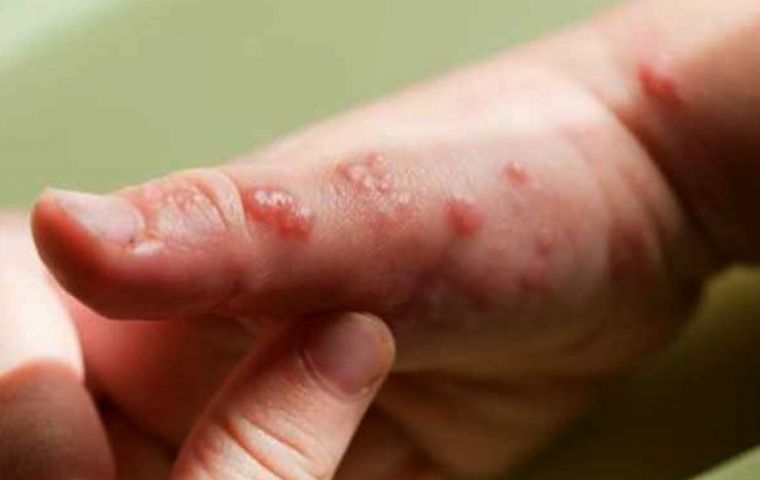
LIMA, Aug 19 (NNN-MERCOPRESS) — Peru has the highest monkeypox infection rate per million inhabitants and it also ranks third in the world behind the United States and Canada, the latest Oxford University global monkeypox surveillance study showed.
The South American country’s Health Ministry announced that since the first case of monkeypox was detected on June 26, the total number of infections had 834 by Monday, Aug 15.
“We are seeing an increase, every day we are treating between 5 and 8 patients,” Moises Guido Sihuancha, head of Epidemiology at the National Hospital Arzobispo Loayza in Lima, was quoted by ANSA as saying.
“About 90% of the cases are patients who have acquired the disease through sexual or non-sexual contact. Almost all of them are men, except for one woman who is a health worker who accidentally caught the disease,” explained Aldo Lucchetti, a physician specializing in infectious diseases at the Arzobispo Loayza National Hospital.
The majority of cases reported worldwide stemmed from Europe and the Americas. Over 35,000 infections and 12 deaths have been reported across 92 nations, as per World Health Organization (WHO) figures disclosed Wednesday. Most infections are mild and patients are cured after 2 to 4 weeks, but some deaths have already been reported in countries such as Spain, Brazil, and Peru.
According to WHO, most people infected are men who have sex with men. On July 24, WHO declared the monkeypox outbreak a public health emergency of international concern, its highest level of alert. The disease was first identified in humans in 1970 in the Democratic Republic of Congo and is endemic in several African countries.
“Almost 7,500 cases were reported last week, a 20% increase over the previous week, which was also 20% more than the week before,” said WHO Director Tedros Adhanom Ghebreyesus Wednesday during his regular press briefing from Geneva.
“The primary focus for all countries must be to ensure they are ready for monkeypox, and to stop transmission using effective public health tools, including enhanced disease surveillance, careful contact tracing, tailored risk communication and community engagement, and risk reduction measures,” said Tedros.
Currently, global supplies of Monkeypox vaccines are limited, as is data about their effectiveness. “WHO is in contact with manufacturers, and with countries and organizations willing to share vaccine doses,” the international agency also said Wednesday.
“We remain concerned that the inequitable access to vaccines we saw during the COVID-19 pandemic will be repeated, and that the poorest will continue to be left behind,” Tedros added. — NNN-MERCOPRESS





